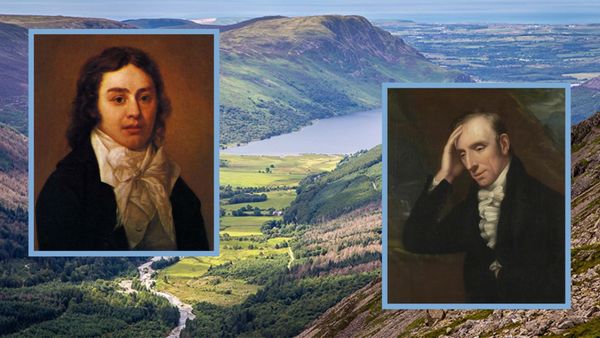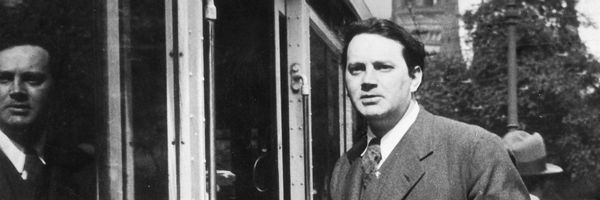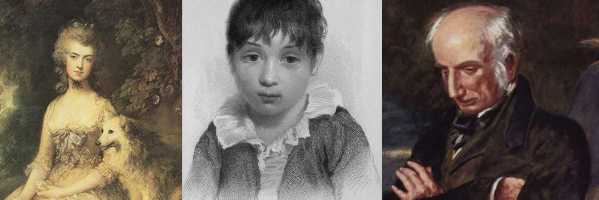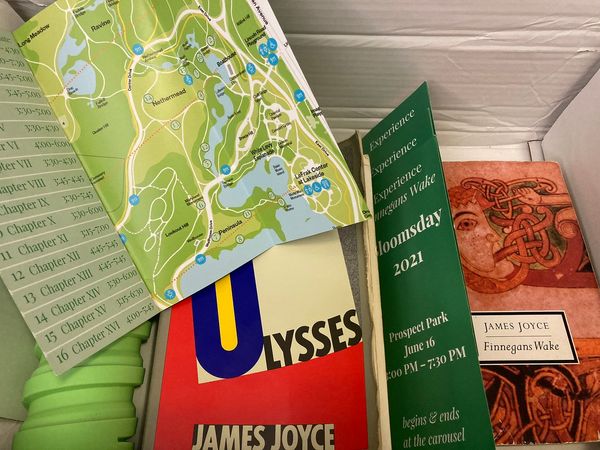A Poem in Ruins

A poem title might be a brief cryptic image or phrase – some little glimpse of something that gets one thinking of evokes an emotion. It is sometimes imagined that Romantic poetry is all about emotion, yet many of William Wordsworth's titles are very precisely defined.
Charlie Kaufman's recent film, I'm Thinking of Ending Things, makes a joke of what a mouthful "Ode: Intimations of Immortality from Recollections of Early Childhood" is. Another banger is "Written with a Slate Pencil, on a Stone, on the Side of the Mountain of Black Comb."
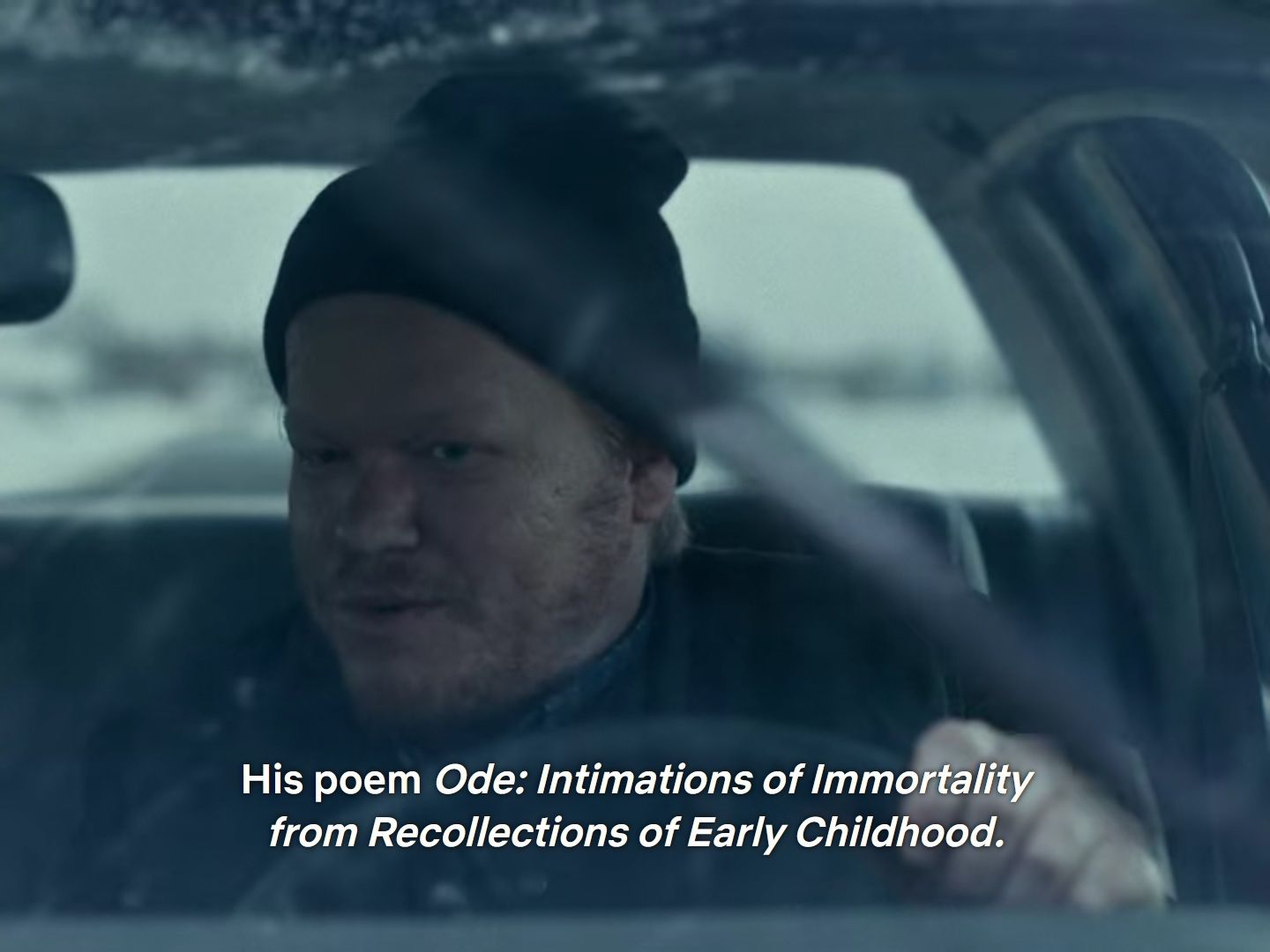
In a couple weeks, I will be leading a discussion of his poem "Lines Composed a Few Miles above Tintern Abbey, On Revisiting the Banks of the Wye during a Tour. July 13, 1798," alongside Percy Bysshe Shelley's more modest – but still situated locationally – "Mont Blanc: Lines Written in the Vale of Chamouni."
Sometimes shortened to "Tintern Abbey" or "Lines," Wordsworth's title makes note of the prominent locale, his own particular slight remove from the scene, the context of the encounter within a tour, that it is a re-visiting, and a precise date and year. That date is coupled with the first line, which notes that "Five years have past" since the initial visit.
A more evocative title might be something like – to borrow from the language of the poem – "Tranquil Restoration" or "Abundant Recompense." What these phrases fail to capture, though, is how much all the particularities of the experience matter to Wordsworth. It is not just reveling in some abstract feeling; he wants to break down the experience to preserve it for the future, and to understand how exactly it might serve his sister who is there now for the first time.
It has been five years since William's previous visit, yet his encounter with these famous ruins has maintained a presence in his mind.
once you find a ruin in the woods your brain changes shape indefinitely
— ꙮ 𝕄𝕪𝕤𝕥𝕚𝕔 𝕊𝕙𝕠𝕣𝕥𝕤 (🍃) (@MysticShorts) March 9, 2021
A similar, simpler encounter offered under a simpler title is "The Ruined Cottage," forming the beginning of a longer poem titled The Excursion. The poem's beautiful natural opening sets up a point of contrast for the human scene he would soon face:
’Twas summer and the sun was mounted high.
Along the south the uplands feebly glared
Through a pale steam, and all the northern downs
In clearer air ascending shewed far off
Their surfaces with shadows dappled o’er
Of deep embattled clouds
When he first sees the ruined cottage, he is still operating within this mindset, with no meaning yet imposed on the scene:
I found a ruined house, four naked walls
That stared upon each other. I looked round
And near the door I saw an aged Man,
Alone, and stretched upon the cottage bench;
An iron-pointed staff lay at his side.
With instantaneous joy I recognized
That pride of nature and of lowly life,
The venerable Armytage, a friend
As dear to me as is the setting sun.
Something is critically missing from his experience, however. As Wordsworth goes on describing the surrounding natural scene – "the garden-ground, now wild" with its "well / Half-choked with willow flowers and weeds" – he readily finds so much more there than in looking at the cottage, in which he sees simply "naked walls." He is then explicitly reproached on this point:
The old Man said, “I see around me here
Things which you cannot see
The old man couples the present scene with a narrative of the past – like Wordsworth's combined seeing of Tintern Abbey and recollection of it five years past – in which the cottage was populated by a generous woman named Margaret, now dead. The walls which are now "naked" were not always so, and those details remain a real presence in the narrative:
Stripp'd of its outward garb of houshold flowers,
Of rose and sweet-briar, offers to the wind
A cold bare wall whose earthy top is tricked
With weeds and the rank spear-grass. She is dead,
And nettles rot and adders sun themselves
Where we have sate together while she nurs'd
Her infant at her breast.
Then, just as Wordsworth opened his narrative with rich description of the setting, the old man is sure to detail the specifics of place and that his discussions with Margaret occurred under these very trees. It is not just a story replacing the depleted scene; the scene itself is rich with the story. It all must be accounted for.
So deeply does the man intertwine the story with the place that when he stops and Wordsworth goes and looks again on the cottage, he returns needing more. The sight becomes unbearable, and the speaker needs a satisfying conclusion:
Long time I had not stayed ere, looking round
Upon that tranquil ruin, I returned
And begged of the old man that for my sake
He would resume his story.
As the old man goes on, we learn how the radical shift between the cottage ground in those early memories and the cottage now in ruins was a gradual loss, a whole story. With Margaret's husband gone and possibly dead, the old man goes on,
Once again
I turned towards the garden-gate and saw
More plainly still that poverty and grief
Were now come nearer to her: the earth was hard,
With weeds defaced and knots of withered grass;
No ridges there appeared of clear black mould,
No winter greenness
Like Wordsworth, the man goes away from the spot for five years – "Five tedious years / She lingered in unquiet widowhood." What happens then, he only knows through hearing others' stories. The decay grew worse and worse without help in maintaining the home, and yet,
Yet still
She loved this wretched spot, nor would for worlds
Have parted hence; and still that length of road
And this rude bench one torturing hope endeared,
Fast rooted at her heart, and here, my friend,
In sickness she remained, and here she died,
Last human tenant of these ruined walls.
This is the end of the old man's story. That last line gives a strong example of one element of Wordsworth's style: so much emotion, yet stated so simply. Shelley often takes a quite different approach. In "Ode to the West Wind," he writes,
As thus with thee in prayer in my sore need.
Oh! lift me as a wave, a leaf, a cloud!
I fall upon the thorns of life! I bleed!
A heavy weight of hours has chained and bowed
One too like thee: tameless, and swift, and proud.
The Romantic era does not offer a singular method of portraying such strong emotion; it serves as a reaction against a world in which such expression seemed to be fading. In the world Wordsworth saw around him, there was increasingly no room for seeing beyond the "naked walls" of that ruined cottage. The old man, too – the keeper of that story – would soon be gone.
Amid these ruins, Wordsworth pulls together what he can. Presented in simplicity, those details linger in the mind, where he trusts that they will have a lasting presence and fuel the future imagination. The sight of the ruins shows just how necessary this is.
For free updates every month connecting readings like this with discussions of new literature and electronic literature, sign up for my newsletter below. I will be sending out an update later this month connecting this to the just-released visual novel When There Is No More Snow – and all new connections and insights each month.


